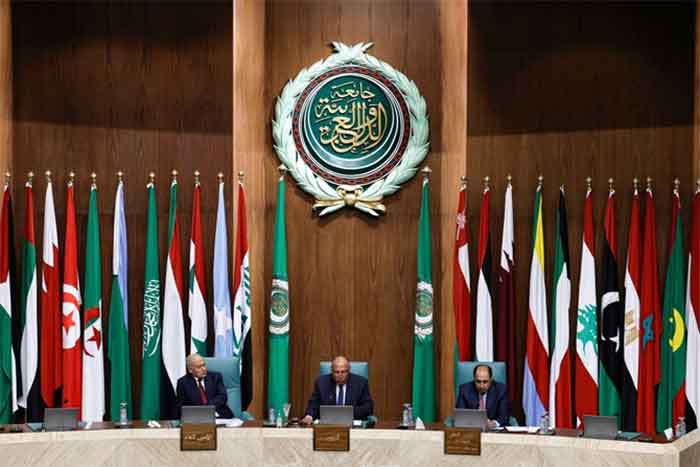
The foreign ministers of Syria, Saudi Arabia, Jordan, Egypt, and Iraq said on Monday after meeting in Amman said the government in Damascus should re-establish the rule of law on all of Syria’s territory, ending the presence of foreign armed groups and terrorists,.
Jordan hosted the meeting, the first of its kind since Syria’s membership in the Arab League was suspended in 2011. Prior to the multilateral meeting, Syrian Foreign Minister Faisal Mekdad met with his Jordanian counterpart Ayman Safadi to discuss refugees, border security and “water issues,” according to Amman.
In a joint statement distributed by state news agencies, the five ministers called for “ending the presence of terrorist organizations” as well as “armed groups” on the territory of Syria, and “neutralizing their ability to threaten regional and international security.” They also pledged to “support Syria and its institutions to establish control over all its territory and impose the rule of law.”
Saudi Arabia, Egypt, Jordan and Iraq pledged to establish ties with the Syrian military and security institutions in order to “address security challenges.” The five ministers also called for stopping “foreign interference in Syrian domestic affairs.” Their joint declaration also called for setting up technical teams of experts that would follow up on the summit and implement practical measures to resolve the conflict in Syria.
The Amman meeting comes just weeks after Mekdad visited Saudi Arabia and received the kingdom’s endorsement for Syria’s territorial integrity. Currently, Turkish-backed militants control parts of northern Syria, while the northeast is under the control of US-backed Kurdish militias. Several hundred US soldiers are also in Syria, controlling most of the country’s oil wells.
Militants backed by the U.S. and Saudi Arabia launched an uprising against Syrian President Bashar Assad in 2011. With the help of Russia and Iran, the government in Damascus eventually prevailed over the collection of rebels, including terrorists affiliated with Al-Qaeda and Islamic State (IS, formerly ISIS). While Syria’s neighbors and regional powers have moved to improve relations with Damascus in recent months, the U.S. has not changed its “regime change” policy.
Saudi Arabia Holds Talks With Syria
Other media reports said:
Syrian Foreign Minister Faisal Mekdad has completed a breakthrough visit to Saudi Arabia, the first such trip since Riyadh cut diplomatic relations with Damascus in 2012. In a joint press statement issued after the visit Saudi Arabia endorsed Syrian unity and integrity, condemned terrorism, and backed a political solution to the 12-year war.
Saudi Foreign Minister Prince Faisal bin Farhan Al Saud had invited his Syrian colleague to Jeddah to discuss “efforts to find a political solution to the Syrian crisis that preserves Syria’s unity, security, stability, Arab identity, and territorial integrity while also serving the interests of its brotherly people,” according to the statement cited by the state news agencies of both countries.
Prince Faisal and Dr. Mekdad agreed on the need to address humanitarian issues and allow aid “to reach all areas of Syria,” establish conditions for the return of refugees and displaced people, and “stabilize the situation in the entire Syrian territories.”
The two sides also committed to enhancing security and “combating terrorism in all its forms,” and agreed on the need to “support the institutions of the Syrian state to extend its control over its territories to end the presence of armed militias and external interference in the Syrian internal affairs.”
Parts of northern Syria are currently under control of Turkish-backed militants, while the area northeast of the Euphrates River is held by U.S.-backed Kurdish militias. Several hundred U.S. troops are also in the country in violation of international law, controlling most of the Syrian oil wells.
The two foreign ministers also discussed steps needed to reach “a comprehensive political settlement of the Syrian crisis,” so the country could return to the “Arab fold,” their joint statement said.
Damascus and Riyadh have begun the procedures needed to resume air travel and consular services between the two countries, while Syria thanked Saudi Arabia for the humanitarian aid provided after the catastrophic earthquakes in February. Much of the aid to Syria has been impeded by the U.S.-imposed ‘Caesar’ sanctions against Damascus.
Saudi Arabia cut diplomatic ties with Syria in February 2012, joining the U.S. in backing the militants that sought to overthrow President Bashar Assad. With the backing of Russia and Iran, the government in Damascus eventually prevailed over the collection of rebel militias that included terrorists affiliated with Al-Qaeda and Islamic State (IS, formerly ISIS).
Rumors that Riyadh was preparing to reverse course began to circulate last month, shortly after China mediated an agreement between Saudi Arabia and Iran to normalize relations. Since then, the kingdom has also launched peace talks to end the eight-year conflict in Yemen.
Damascus And Cairo Close To Restoring Ties
Another media report said:
Syria and Egypt are in advanced talks to restore diplomatic relations that were severed after the outbreak of the conflict in Syria back in 2011, informed sources have told the Wall Street Journal.
A summit is scheduled between Syrian President Bashar Assad and his Egyptian counterpart Abdel Fattah el-Sisi, shortly after the Muslim holy month of Ramadan ends in late April, the U.S. outlet reported.
On Saturday, Syrian Foreign Minister Faisal Mekdad made his first official visit to Cairo in more than a decade, holding talks with Egypt’s top diplomat Sameh Shoukry.
According to the Syrian Foreign Ministry, the two sides discussed “various aspects of bilateral cooperation and ways to strengthen brotherly relations,” during the meeting.
The Egyptian Foreign Ministry in its statement reported that the ministers “agreed to intensify channels of communication between the two countries at different levels during the coming phase.”
Shoukry reiterated Cairo’s support for a “comprehensive political settlement to the Syrian crisis as soon as possible,” the statement read.
According to WSJ’s sources, the parties were also expected to discuss Syria’s possible return to the Arab League during the talks in Cairo. Damascus’ participation in the group of 22 nations was suspended 12 years ago when members accused Syria of a violent crackdown on opposition.
Assad’s government, which insists that it has been fighting international terrorism all those years, has by now been able to regain almost full control of Syrian territory with the assistance of its allies Russia and Iran.
Diplomatic relations between Cairo and Damascus were cut in 2013 under the previous Islamist Egyptian government of Mohamed Morsi, which backed the Syrian opposition. When announcing the closure of the embassy in Syria, Morsi also decried the involvement of Lebanese armed group Hezbollah in the conflict on the side of Damascus and urged that a no-fly zone be established above the country.
The mending of relations between Damascus and the rest of the Arab World has been spearheaded by the United Arab Emirates, which reopened its Syrian embassy in 2018 and has been visited by Assad twice over the past two years.
The Syrian armed turmoil began in 2011 with foreign backing, triggered a war that killed over 500,000 people and created a massive refugee crisis. Assad emerged victorious, regaining control of most of his country, thanks largely to military and economic support from Iran and Russia. Iranian officials hope that success will inspire other nations opposed to US hegemony.
CIA Chief Admits U.S. blindsided By Saudi-Iran Deal
CIA Director William Burns has told Saudi officials that the U.S. was caught off guard, after the kingdom agreed to a normalization deal with Iran brokered by China, according to the Wall Street Journal.
During an unannounced trip to Saudi Arabia this week, Burns “expressed frustration” with Riyadh and said Washington “felt blindsided” by its renewed diplomacy with both Iran and Syria, multiple unnamed sources told the Journal on Thursday.
After years of strife as regional adversaries, Tehran and Riyadh concluded the normalization pact on March 10 following secret talks mediated by Beijing, agreeing to resume formal diplomatic relations after they cut ties in 2016. The deal marked a major diplomatic achievement for China and a significant shakeup in the geopolitics of the Middle East.
Since the agreement was announced, top diplomats from Saudi Arabia and Iran have spoken on the phone for a number of times, and hope to reach compromises on several outstanding issues – namely the war in Yemen, which has raged on for more than eight years and left hundreds of thousands dead.
Tehran is also working to reestablish contacts with the United Arab Emirates, another Gulf monarchy long at odds with the Islamic Republic. Earlier this week, Iranian Deputy Foreign Minister Ali Bagheri said his country had appointed an ambassador to Abu Dhabi for the first time in nearly a decade. Riyadh is also reportedly seeking to reach a similar understanding with Syria, and hopes to invite President Bashar al-Assad for a visit later this year, according to Reuters.
While the White House has welcomed the new diplomacy in public, Burns’ reported complaints to Saudi officials this week could highlight concerns over Beijing’s growing influence in the region. Tensions between Riyadh and Washington have also been on the rise since last year, when OPEC+, a group of major oil exporters led by Saudi Arabia, opted to slash production. The move reportedly “angered” U.S. President Joe Biden, who claimed the cut would benefit Russia, another large energy exporter.















































